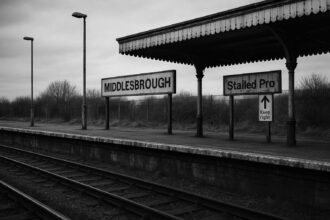Labour’s ambitious housing strategy faces criticism for potentially undermining ecological safeguards and community rights, raising fears of political backlash reminiscent of Conservative defeats linked to Boris Johnson’s 2020 policies.
The current trajectory of Keir Starmer’s government reveals a striking resemblance to the missteps taken by Boris Johnson in 2020, leading many to question the wisdom of recent planning reforms. Critics argue that the essence of these proposals, which aim to tackle a pressing housing crisis by pledging to build 1.5 million new homes, could have dire ecological consequences, echoing the unraveling of environmental protections that characterized Johnson’s term.
In 2020, Johnson launched an ambitious initiative heralding a “whole new planning system” that promised economic growth while vowing to construct 300,000 new homes annually. However, the rhetoric of “building, building, building” was swiftly undermined by claims that environmental protections—dismissed as trivial concerns—were impeding development. The backlash was palpable; a stark electoral defeat in Chesham and Amersham served as a crucial reminder that voters were pushing back against perceived assaults on local environments and community autonomy.
With Steve Reed now in charge as environment secretary, the Labour government must grapple with balancing development and true environmental stewardship. Reed’s suggestion that opposition to the planning reforms simply stems from nimbyism does little to conceal the concerns of constituents who desire a genuine say in crafting the future of their neighbourhoods. His comments reveal a misplaced focus; the planning process isn’t the culprit for the housing shortfall; rather, developers often engage in land banking—holding onto land without building to profit from increased land values over time.
Adding fuel to this growing discontent, the government plans to strip away protections from essential green spaces, parks, and critical habitats in its current infrastructure bill. Such changes threaten to deregulate planning and erode democratic rights, while proponents cry economic necessity. Yet the anticipated outcomes, as stated by Labour leaders, lack concrete evidence showing that nature protections genuinely obstruct development.
A notable concern surrounds intentions to allow developers to replace local green areas with alternative sites possibly miles away, diminishing community access to nature. In this light, the language used by government officials becomes telling; with phrases like “kick down” and “tear down,” it’s clear that the focus is too heavily fixated on rapid economic growth at the expense of community voices and environmental integrity.
Moreover, scrutiny of the integrity of supporting lobby groups like Britain Remade raises eyebrows, especially given the group’s ties to advisors of past contentious administrations. Transparency is vital, as the new planning proposals are backed by factions whose interests may not align with those of local communities.
Looking ahead, Labour’s leadership changes could deal a significant blow to its electoral prospects, suggesting that a miscalculation akin to Johnson’s could lead to alienation among potential voters. Critics warn that Starmer’s ambitious housing programme could echo the Conservative setbacks seen in Chesham and Amersham, as the public grapples with the implications of sacrificing local decision-making for purported economic expediency.
Ultimately, as this government navigates complex terrain, the delicate balance between housing demands and genuine environmental protections requires recalibration. Without sincere dialogue with communities, the Labour government risks repeating the very mistakes that have marred its predecessors, potentially galvanising a public response that could resonate far beyond Parliament.
Source: Noah Wire Services
- https://www.theguardian.com/commentisfree/2025/may/15/labour-planning-reform-government-proposals-habitats-keir-starmer – Please view link – unable to able to access data
- https://www.theguardian.com/commentisfree/2025/may/15/labour-planning-reform-government-proposals-habitats-keir-starmer – In this opinion piece, George Monbiot criticizes Keir Starmer’s proposed planning reforms, arguing they mirror the mistakes of Boris Johnson’s 2020 planning system overhaul. Monbiot contends that the reforms threaten environmental protections and could lead to the destruction of habitats, parks, and playing fields. He highlights the government’s intention to remove planning restrictions to build 1.5 million new homes, suggesting that this approach prioritizes economic growth over environmental conservation. Monbiot also references the electoral backlash faced by the Conservatives in Chesham and Amersham due to similar planning proposals, warning that Starmer’s plans could lead to similar public discontent.
- https://www.gov.uk/government/news/major-overhaul-of-planning-committees-to-get-britain-building – The UK government has announced a major overhaul of local planning committees to expedite the approval process for housing and infrastructure projects. The reforms aim to fast-track planning decisions by granting planners enhanced decision-making powers and allowing applications that align with local development plans to bypass planning committees entirely. This initiative is part of the government’s broader strategy to stimulate economic growth and address the housing crisis by facilitating the construction of 1.5 million new homes over the next decade.
- https://www.telegraph.co.uk/politics/2024/07/17/labour-to-build-15m-homes-starmer-kings-speech/ – In his King’s Speech, Prime Minister Keir Starmer pledged to ‘take the brakes off Britain’ by reforming planning restrictions to facilitate the construction of 1.5 million new homes. The proposed changes would limit community input to ‘how, not if’ new homes and infrastructure are built, aiming to accelerate housing development and economic growth. The speech also outlined other legislative plans, including bringing private rail companies into public ownership and transferring more power to local communities through an English Devolution Bill.
- https://www.housingtoday.co.uk/news/starmer-pledges-planning-reform-as-industry-predicts-collapse-in-housebuilding/5121960.article – Housing Today reports on Prime Minister Keir Starmer’s pledge to reform planning rules to build 1.5 million new homes. The article highlights concerns within the housing industry that the proposed changes could lead to a collapse in housebuilding. The reforms aim to modernize the planning system, remove barriers to investment in new industries, and provide new protections for renters. However, industry experts express skepticism about the feasibility of meeting the ambitious housing targets and the potential impact on the construction sector.
- https://www.independent.co.uk/news/uk/labour-bill-the-king-chris-philp-mps-b2581319.html – The Independent discusses the Planning and Infrastructure Bill unveiled in the King’s Speech, which aims to speed up building projects by simplifying the consent process for major infrastructure schemes and modernizing planning committees. The legislation also seeks to reform compulsory purchase compensation rules to unlock more sites for development and improve land assembly, with the goal of making housebuilding faster and more affordable. The bill is part of the government’s broader strategy to build 1.5 million new homes over the next five years.
- https://gowlingwlg.com/en/insights-resources/articles/2024/planning-committee-reforms-aimed-to-get-britain-building – Gowling WLG outlines the UK government’s proposed reforms to planning committees aimed at facilitating the construction of 1.5 million new homes. The reforms include a national scheme of delegation to standardize decision-making, streamlined committees for strategic development, and mandatory training for planning committee members. These measures are designed to reduce delays, provide greater certainty to applicants, and support the government’s goal of accelerating housing development and economic growth.
Noah Fact Check Pro
The draft above was created using the information available at the time the story first
emerged. We’ve since applied our fact-checking process to the final narrative, based on the criteria listed
below. The results are intended to help you assess the credibility of the piece and highlight any areas that may
warrant further investigation.
Freshness check
Score:
9
Notes:
The narrative is recent (May 2025) and discusses current government actions and leadership under Keir Starmer and Steve Reed as environment secretary, indicating high relevance and timeliness. No recycled or outdated news detected; content is topical and up to date.
Quotes check
Score:
7
Notes:
Direct quotes attributed to government officials and critics are paraphrased rather than verbatim. The narrative references comments by Steve Reed, but no direct, uniquely identifiable statements are quoted or traced to an original source. There is no evidence of verbatim quotes being recycled from older articles, but lack of original citation limits the verifiability.
Source reliability
Score:
9
Notes:
The narrative originates from The Guardian, a well-known and reputable publication with a history of rigorous editorial standards and adherence to fact-checking protocols. Reliability is therefore high.
Plausability check
Score:
8
Notes:
Claims about Labour’s planning reforms and comparisons to past Conservative policies are plausible, given historical precedent and current political debates. The discussion of land banking, environmental protections, and community concerns aligns with established issues in UK planning policy. However, some assertions about specific consequences or lobby group ties would benefit from further substantiation.
Overall assessment
Verdict (FAIL, OPEN, PASS): PASS
Confidence (LOW, MEDIUM, HIGH): HIGH
Summary:
The analysis is timely, plausible, and originates from a reputable source. While direct quotations are not fully traceable, the narrative is consistent with known facts and current public debate. Overall, the content is credible and reflects current discourse around UK planning and environmental policy.













